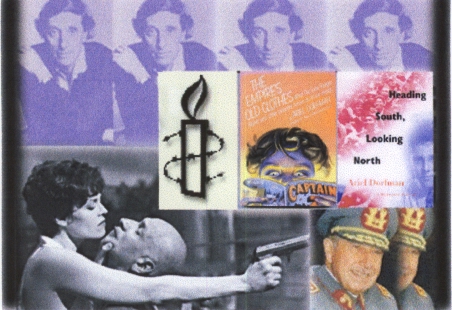

Ariel Dorfman Gives Distinguished Lecture
Ariel Dorfman, Walter Hines Research Professor of Literature and Latin American Studies at Duke University, will give the Austin College Distinguished Lecture for the fall, at 11am, on Thursday, October 5, 2000, in Wynne Chapel. He will discuss "Can the Margins Take over the Center? A Journey from Santiago to Broadway to Hollywood."
The talk will examine two of his plays, "Death and the Maiden" and "Widows" and how their production and reception test the limits that subversive and "remote" material faces in the global marketplace.
Related Events:
¥Dramatic Reading os Viudas (Widows), 7pm, October 4, Arena Theatre
¥Carry-Your-Tray Luncheon with Ariel Dorfman, 12:15pm, October 5, Mabee Banquet Hall
Driving directions to Austin College, Sherman, Texas
Biographical Data:
Dorfman was born in Argentina, emigrated to New York as a child, fled to Chile during the McCarthy era, and was in exile from Chile for eighteen years, following the 1973 coup by dictator Augusto Pinochet. A longstanding activist for human rights, Dorfman has taught at the Universidad de Chile, the Sorbonne (Paris IV) and the University of Amsterdam. His major publications include essays on literature and politics, collections of poetry and short stories (Last Waltz in Santiago and Other Poems of Exile and Disappearance, 1988, My House is on Fire, 1990). His novels include Widows (1983), The Last Song of Manuel Sendero (1986), Mascara (1988), Hard Rain (1990), Konfidenz (1995), and Nanny and the Iceberg (1999). His non-fiction books include The Empire's Old Clothes (1983) and Heading South, Looking North: A Bilingual Journey (1998). His plays have won many awards, including the Sir Lawrence Olivier Award for Best Play in London, and the Roger L. Stevens Award of the Kennedy Center in Washington, D.C. Death and the Maiden was made into a Roman Polanski film. His books have been translated into over thirty languages, and he is a frequent contributor to publications such as The New York Times, The Los Angeles Times, The Nation, and The Village Voice.
Salmon Rushdie has called him "one of the most important voices coming out of Latin America" and Jacobo Timmerman "one of the six greatest living Latin American novelists."